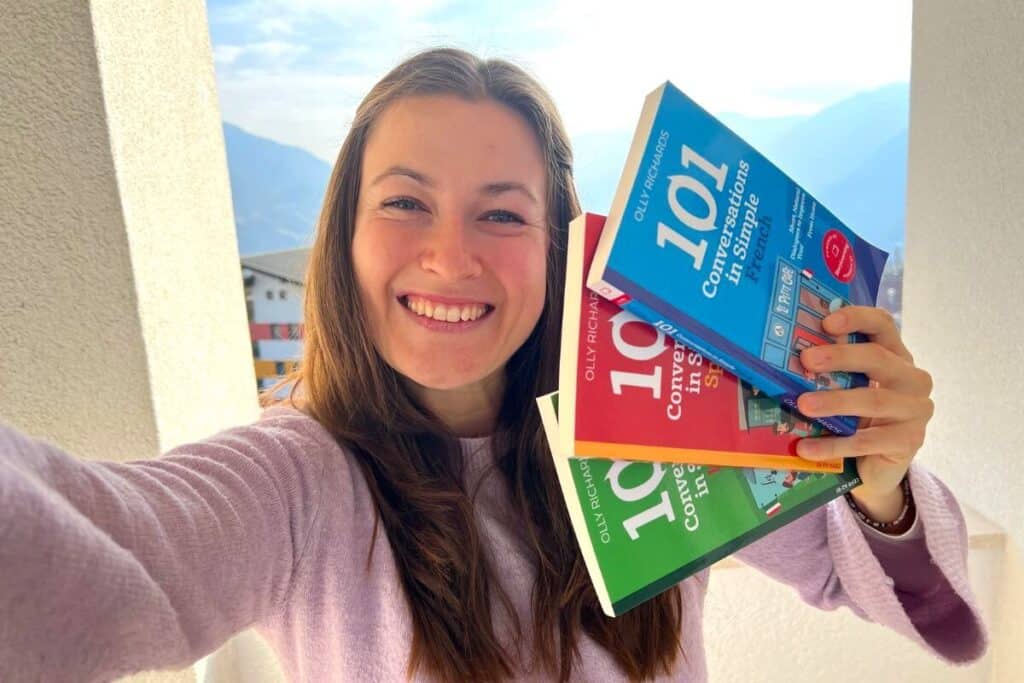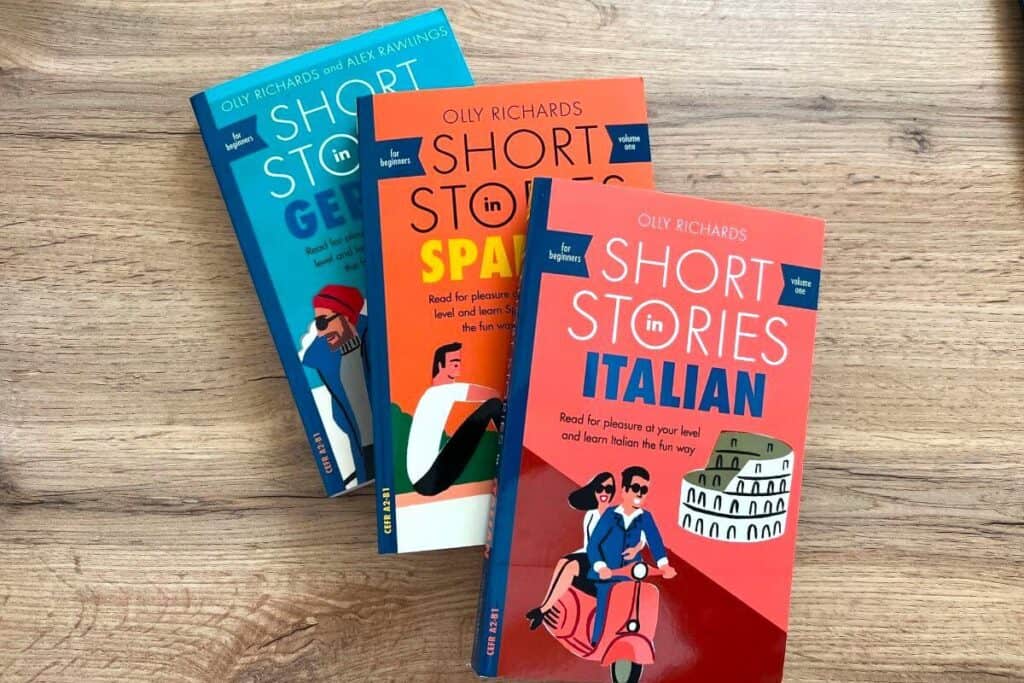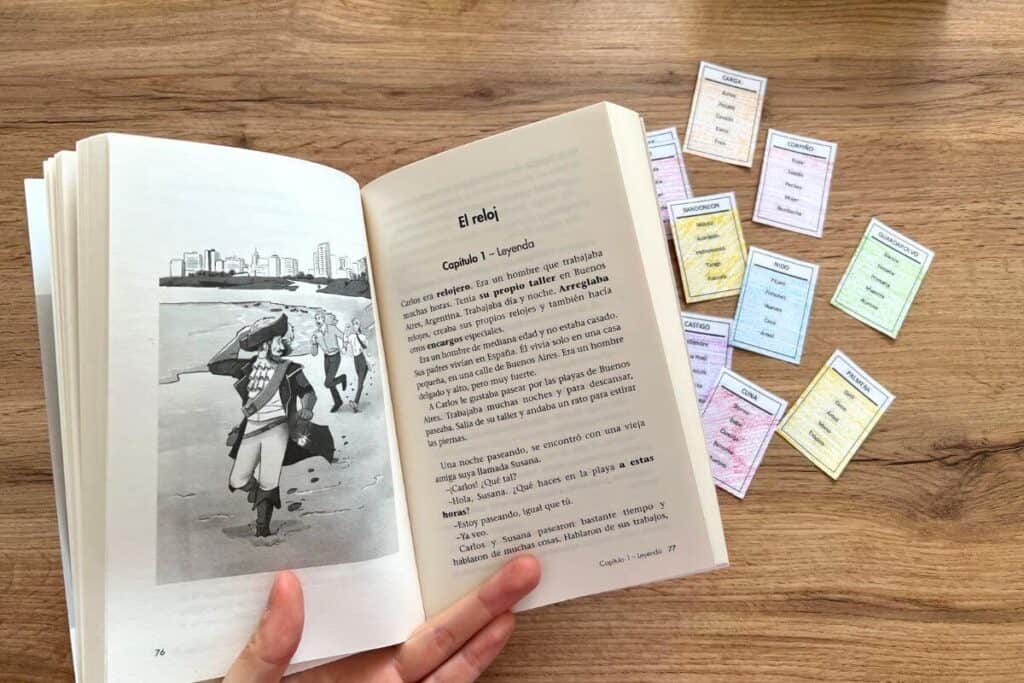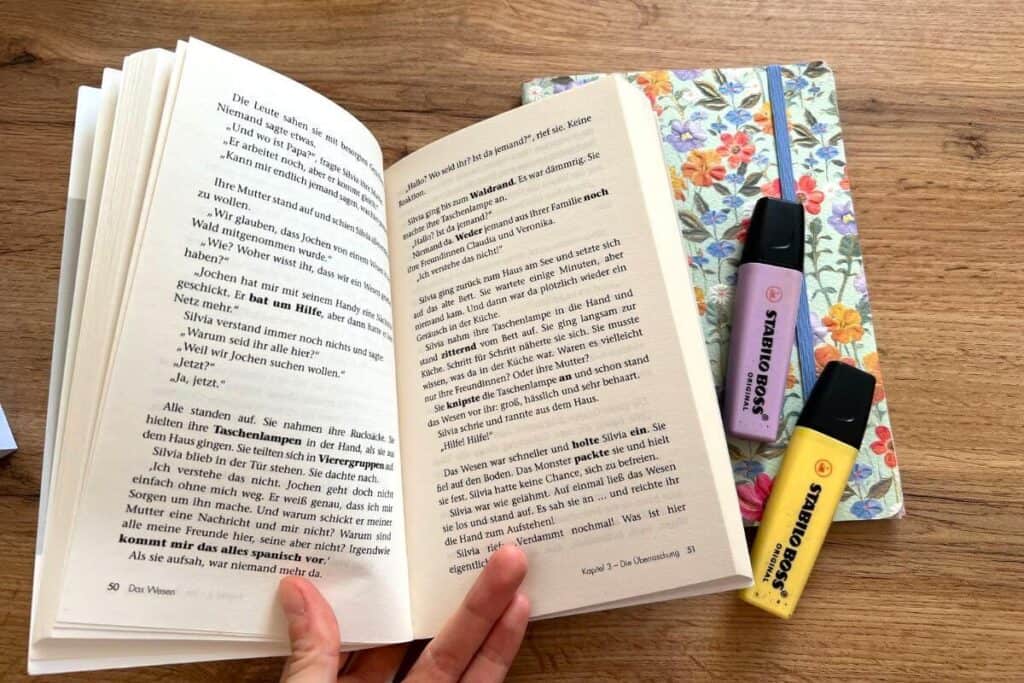Reading is one of the best ways to make the first contact with a language you’re learning. I’ve picked some of my favorite language books that use simple vocabulary so you can understand it from the beginning. You’ll get to read short dialogues, so it’s not too overwhelming, and you’ll gain a basic understanding.
I’ve already learned 3 foreign languages, and reading books has significantly helped me to boost my language skills.
So, in this article, I’ll share the best foreign language books with you, so you can pick one and start engagingly learning your dream language.
6 Best Foreign Language Books
Here is a list of the best foreign language books I like reading to improve your language skills. Just replace the word ‘language’ with the language you want to learn, pick the book that interests you, and start reading:
- 101 Conversations In Simple ‘Language’
- Short Stories ‘Language’
- Series Of ‘Language’ Novels For Beginners
- First ‘Language’ Reader – A Beginner’s Dual Language Book
- Little Prince (books with famous stories)
- 501 ‘Language’ Verbs
✈ Language Resources For Your Learning ✈
Here are some of my favorite language-learning resources I use to learn foreign languages:
| Practice speaking on iTALKI Listen to a podcast on COFFEE BREAK LANGUAGES Read 101 CONVERSATIONS IN SIMPLE ‘LANGUAGE‘ Get my LANGUAGE TRAVEL NOTEBOOK to keep track of new words Watch TV Series & Movies on LINGOPIE. |
1. 101 Conversations In Simple ‘Language’
Whenever I start learning a new language, I choose this book to enhance my reading skills and learn new vocabulary. It uses simple words you’ll use in your everyday life once you travel to the country, which is what we are looking for.
This book will take you into a real-life conversation with its 6 characters, who help you understand and speak like a local. The dialogues come from typical daily situations like being in a shop or café, ordering something, making arrangements, meeting friends and people on the street, and communicating with them easily.
You’ll also get English definitions and explanations in each chapter to guide you through the context, words, and meanings.
You can get the book in the following languages:
- SPANISH: 101 Conversations In Simple Spanish
- FRENCH: 101 Conversations In Simple French
- ITALIAN: 101 Conversations In Simple Italian
- GERMAN: 101 Conversations In Simple German
- RUSSIAN: 101 Conversations In Simple Russian

2. Short Stories In ‘Language’
After reading ‘101 Simple Conversations’, head to the next one with exciting stories. Short Stories In ‘Language’ is a great collection of language books for beginners.
Each of them contains 8 stories. They have various genres, from crime stories to fiction, romance, and comedy. Their stories are captivating and easy to understand. They’ll soon give you the feeling that you are making progress with your language. You’ll understand more and more from one page to another.
The book also contains the 1000 most frequent words to help you understand the core of the stories. It also gives you a bilingual word list and a summary of the plot. After each chapter, there is a section with comprehension questions to ensure you are on track with the story.
You can get the book in the following languages:
- SPANISH: Short Stories In Spanish
- FRENCH: Short Stories In French
- ITALIAN: Short Stories In Italian
- GERMAN: Short Stories In German
- RUSSIAN: Short Stories In Russian

👉 READ ALSO: How To Learn A Language My Yourself: My Proven Language Learning Tips
3. Series Of ‘Language’ Novels For Beginners
Learning a language with a book series is great for learning a wide range of vocabulary and preparing for small talks.
You don’t have to think about which book to read next once you finish reading one book. The other 4 books are waiting for you, and you can be sure to learn words in different topics/situations.
These book series also have a free foreign language dictionary you can download.
You can pick some novels you already know in your native language and order the books in the language you want to learn. I have something for Spanish and French learners here.
For Spanish learners, get the Spanish novels for beginners. These are great books with thrilling and exciting stories.
If you’re learning French, check out these French novels: Petit Déjeuner à Paris, Déjeuner à Paris, and Dîner à Paris. I haven’t read these books yet (they are on my list), but if you like book series, I’m sure they’ll be useful for you.
Here is a quick list of the novels for different languages:
- SPANISH: Spanish Novels For Beginners (Muerto in Buenos Aires, Futbol en Madrid, Ana Estudiante, Los Novios, Tango Milonga)
- FRENCH: Petit Déjeuner à Paris, Déjeuner à Paris, Dîner à Paris
- ITALIAN: Pick your favorite novel & find it in the foreign language you’re learning
- GERMAN: Pick your favorite novel & find it in the foreign language you’re learning
- RUSSIAN: Pick your favorite novel & find it in the foreign language you’re learning

4. First ‘Language’ Reader – A Beginner’s Dual Language Book
This book will bring you to the life of countries, the culture, and thinking of people where your chosen language is spoken. It uses simple vocabulary, which makes it easy for you as a beginner to understand.
The best part is that it offers English translation on the opposite page, so you can double-check and look up new words right away. Have your language travel notebook ready to write these new words down. It also includes vocabulary and some exercises to help you work with new vocabulary from the book.
You can get the book in the following languages:
- SPANISH: First Spanish Reader
- FRENCH: First French Reader
- ITALIAN: First Italian Reader
- GERMAN: First German Reader
- RUSSIAN: First Russian Reader
- PORTUGUESE: First Portuguese Reader

5. The Little Prince
One of the most effective ways to learn and practice a foreign language regarding book reading is to take a story you already know. The Little Prince might be one of those.
Since you are familiar with the story and events in it, you can associate things and vocabulary much more easily. It also helps you to assume the meaning of words before looking them up in a dictionary. It’s a very efficient method.
This book is particularly great for small dialogues and to learn past tense. I recommend reading it after you understand beginner vocabulary and sentences.
First, as an absolute beginner, choose the books that are ranked as number 1 and 2 on my list. Then grab a book with more comprehensive stories like The Little Prince.
➡ Get the Little Prince in Spanish here.
👉 READ ALSO: How To Set Achievable Language Learning Goals: 9-Step Guide
6. 501 ‘Language’ Verbs
Lastly, let’s incorporate some basic grammar into your learning process – while I don’t want you to stuff your head with grammatical rules (please don’t do this to yourself), it’s essential to get a general understanding of basic grammar structures.
Otherwise, we can’t produce the language correctly. So, I’ve got a book to help you learn how to conjugate words and speak correctly.
501 ‘Language’ Verbs book can serve you more as a reference while you are reading, listening, or speaking, and if you don’t know how to use a word in other persons, you can look it up.
It’ll serve as a guide and back you up when you are stuck in a conversation or trying to create your own dialogue.
The book is available in the following languages:
- SPANISH: 501 Spanish Verbs
- FRENCH: 501 French Verbs
- ITALIAN: 501 Italian Verbs
- GERMAN: 501 German Verbs
- RUSSIAN: 501 Russian Verbs
- LATIN: 501 Latin Verbs
- HEBREW: 501 Hebrew Verbs

How To Learn A Language Using Foreign Language Books
You don’t have to use books in foreign languages specifically to learn languages. You can just read interesting stories without even noticing that you are learning new words. The approach you choose is your decision.
Here are my two ways of how I like to learn languages while reading books:
1. APPROACH
You can read 1 or 2 pages a day, highlighting new vocabulary you want to add to your list.
First, read 1 page and try to understand the context. After, reread it and highlight each word you don’t understand and want to remember. After, look these words up in a dictionary.
Foreign language books for beginners usually have translations on the next page, so you can look up the new words without even searching them in a dictionary. Then, read-only these new words out loud.
I also suggest putting these words into a Google Translate, listening to their pronunciation, and repeating them a few times. It’ll make you remember the words more easily, and you’ll get the pronunciation right at the beginning.
Then, write the new words down in your language notebook to keep track of all the vocabulary you want to remember.
You can follow this approach when you’re trying to learn new vocabulary as you’re reading.
2. APPROACH
The second way is to read the book, 1 or 2 pages a day, without looking up the words. You only focus on understanding the context and assuming the meaning of the chapters.
However, this approach is better to practice once you understand more vocabulary at the intermediate level.
Benefits Of Reading Foreign Language Books When Learning A Language
You still can’t decide whether you should read books in a foreign language as an absolute beginner? Let me tell you how it’ll help you to improve your language skills and why they’re great for beginners:
- Use simple vocabulary
- They are usually written in dialogues (practice everyday conversations)
- You can learn useful/basic vocabulary
- Improve your understanding
- Learn at your own pace
- See how words are written
👉 READ ALSO: 7 Benefits Of Learning A Foreign Language For Travel
BONUS: Most Important Skills Of Language Learning
There are 4 main types of language skills; reading is one of them. I always recommend incorporating all 4 skills to be successful in your language journey.
I’ve written a separate article discussing all 4 (and even more) types of language skills and how you can build each of them to master the most important skill: speaking.
Get more resources and understand the whole picture by clicking on the image below:
Get My Language Travel Notebook
I’ve also created a language notebook to help you keep track of the vocabulary, sentences, and dialogues you want to learn. Whenever you come across new words while reading, jot them down, and you’ll always have them to refer back to if you forget their meanings.
Click on the image below to get my language travel notebook:
FAQs
I’ve also answered some of the most frequently asked questions about language learning and language books in general. So check out my answers below:
What Are The Best Language-Learning Books?
101 Conversations In ‘Language’ and Short Stories In ‘Language’ are the best language learning books. They use simple and everyday vocabulary, engaging stories and dialogues that you’ll need to master to communicate in real-life situations. These 2 books prepare you to speak in various situations.
Which Is The Most Useful Foreign Language To Learn?
English, Spanish, German, and Chinese are the most useful languages. But overall, it depends on where exactly you’ll travel or use the language, so it’s best to focus on the language that will benefit you the most in your life.
What Is The Most Widely Translated Book In The World?
The Bible is the most translated book in the world. It’s been translated into 694 world languages.
WRAP-UP: Best Foreign Language Books
These are my favorite foreign language books, and I like to read and learn new languages from them. They’ll truly give you a great understanding of the language as a beginner, help you to understand everyday dialogues, and prepare you to take the first steps to speak your dream language. So grab the one that seems the most interesting for you, and start reading.
If you have any questions about language learning or need help learning your foreign language, contact me at info(at)voicesoftravel.com. I’ll be happy to help you.
Happy Learning!
More Language Learning Tips
Looking for more language learning tips & resources?
Check out my related articles:
9 Best Foreign Language Magazines To Boost Your Language Skills
12 Unique Gifts For Language Learners & Guide How To Pick The Right One
How To Watch Tv Shows In Different Languages + Study Tips
8 Best Spanish Audiobooks For Beginners With Study Guide
6 Best French Audiobooks For Beginners With Study Guide
13 Best German Audiobooks For Beginners With Study Guide

About the author: Nicoletta is a travel enthusiast and passionate language learner. While traveling, she loves to connect with locals using her language skills to learn about new cultures. Look for her skiing, hiking in the mountains, or exploring new destinations as she designs travel itineraries for her clients.
LANGUAGES: Interested in more articles about languages and materials?
Check out my Language Resources:







![Read more about the article 9 Great Spanish Books For Beginners: Learn Spanish With Ease [2025]](https://voicesoftravel.com/wp-content/uploads/2025/02/best-spanish-books-for-beginners-300x213.jpg)
![Read more about the article What To Learn In A New Language: Step-By-Step Guide [2025]](https://voicesoftravel.com/wp-content/uploads/2025/02/what-to-learn-in-a-new-language-step-by-step-guide-300x213.jpg)